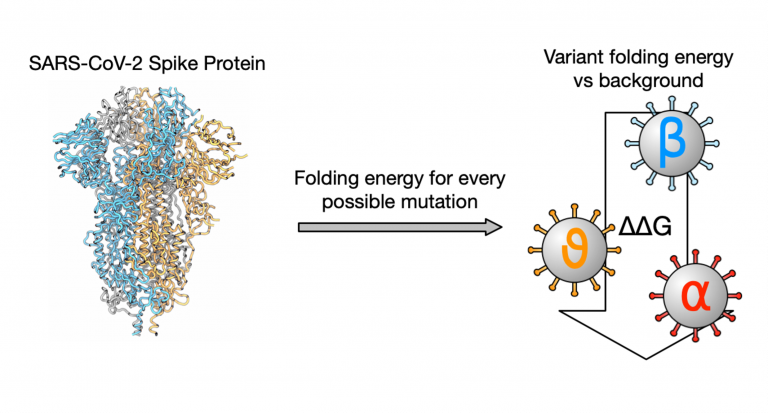COVID-19 variants are evolving to become more stable
27 September 2021
Researchers David Shorthouse and Benjamin Hall from the UCL Department of Medical Physics and Biomedical Engineering have shown that variants of SARS-CoV-2 are evolving to become more chemically stable.

Over the past few months, headlines concerning new COVID-19 variants have become commonplace. Mutations of the SARS-CoV-2 virus has led to variants that are more transmissible and could also possibly threaten the efficacy of COVID vaccines. Now, David Shorthouse and Benjamin Hall from the UCL Department of Medical Physics and Biomedical Engineering have shown that variants of SARS-CoV-2 are evolving to become more chemically stable.
Chemical stability is a measure of how long a protein can function for, and for how tightly folded the 3-dimensional structure is. More stable proteins last longer, and are better able to interact with binding targets, such as the human ACE2 receptor that is targeted by the SARS-CoV-2 spike protein. Our researchers have demonstrated that variants of the virus are evolving to increase the stability of their spike proteins – the molecule required for binding and infecting human cells.
Researchers unpicked this finding by predicting the stability of every one of the thousands of potential mutations in the spike protein and showing that the mutations evolution is selecting for are more stable than expected by random chance. This finding indicates that the effect of a mutation on the stability of the protein is an important consideration for tracking and predicting COVID-19 evolution, and could potentially play a future role in vaccine design – as vaccine resistant variants will likely be more stable than current ones.

By calculating the folding energy of every possible mutant to the COVID-19 spike protein, researchers have shown that the mutations in emerging variants have a lower energy than expected.
The researchers also postulate that there may be a balance occurring in the evolution of COVID-19 variants. Some mutations may confer a highly advantageous property to the virus, but cause the protein to be less stable (and therefore more likely to unfold and cease functioning). One way of managing this would be for the virus to also increase its stability with a different mutation at the same time, which the researchers find some evidence is occurring.
Overall this work, recently published in the Journal of Chemical Information and Modelling, improves our understanding of SARS-CoV-2 evolution, and the group are now discussing how to incorporate this work into the current UK pipeline to analyse emerging variants.
Read more about this research in News Medical and preLights.
 Close
Close

